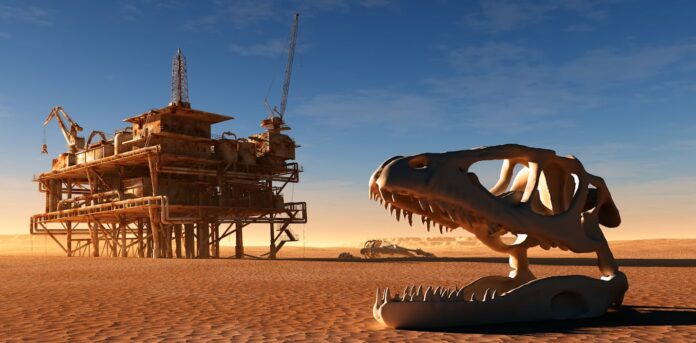Put a T-rex in your engine! The oil that we exploit today was formed several million or ten million years ago. If it’s that old, did it form from dinosaurs? Knowing that 1/3 of greenhouse gas emissions responsible for global warming are due to combustion of oil and natural gaswould we be facing a vengeance from beyond the grave of the dinosaurs, worthy of the pharaohs of Egypt? In reality, no, oil, just like natural gas, comes essentially from the degradation of microorganisms, including phytoplankton.
Oil and natural gas are hydrocarbonsthat is to say a set of molecules rich in carbon and hydrogen. Hydrocarbons are molecules that we call organic. On Earth, these are overwhelmingly made by, and present in, living beings: proteins, carbohydrates, lipids, DNA… but they are also those coming from their degradation. In soils, we find the accumulation of dead leaves in the litter or the degraded organic matter of thehumus. We also find sedimentary organic matter, that which is buried in marine, lake or delta sediments.
Every week, our scientists answer your questions.
Do not hesitate to write to us to ask yours and we will find the best person to answer you.
And of course, there is no such thing as stupid questions!
Thus, oil and natural gas are the result of the burial of certain types of organic matter over millions of years. When organisms die, they sink to the bottom of the water, gradually burying themselves in the sediment where temperature and pressure increase, transforming the accumulated cells into hydrocarbons if the physical and geological conditions are the good ones. Geologists study this material to understand where it comes from and from what living organisms it was formed by studying specific molecules, called “biomarkers”which are in a way fossils of organic matter.
No T-rex or Diplodocus remains in the oil
The study of oil deposits reveals several things. First, they are oceanic deposits, which already suggests that they do not contain T-rex or Diplodocus remains. Could oil contain remains of marine dinosaurs? In reality, biomarkers indicate that the organic matter causing the oil is primarily an accumulation of microorganisms and algae.
For example, we find in oils the product of the degradation of chlorophyll, essential for photosynthesis in plants and bacteria. Furthermore, the source rocks, that is to say those containing the organic matter at the origin of the oil, have ages ranging from -15 has -550 millions of years (even a billion years)! By comparison, dinosaurs were “only” present on Earth from -230 to -66 million years ago. So the formation of oil is independent of the presence of dinosaurs, or even animals.
That said, it is true that most of the oil resources exploited by our societies were formed during the Jurassic and Cretaceous eras, when dinosaurs roamed the globe. Indeed, these hot periods were conducive to the burial of large quantities of organic matter. It is therefore possible to imagine that certain oils contain pieces of dinosaurs.
Dinosaurs didn’t weigh very much
But, if they could be gigantic, we must not forget that, just like mammals, they most certainly represented only a small fraction of the biomass (the total mass of living organisms). Today, if we add up the weight of all the carbon in all living matter, animals as a whole barely represent 0.5% of this total. And mammals, terrestrial and aquatic, do not even represent… 0.05% of the total. In reality, insects, molluscs and worms are much more abundant. And this does not in any case reach the overwhelming presence of plants, followed by bacteria, on land as well as at sea.
It is therefore logical to imagine that the accumulation of zoo- and phyto-plankton ultimately surpasses the accumulation of carcasses of large animals such as dinosaurs. And note that oil deposits form during warm periods in Earth’s history. Since the burial of organic matter in sediments helps store CO₂ out of the atmosphere, the formation of oil and natural gas over millions of years has helped cool the Earth’s surface, while their abrupt release by humans into the atmosphere helps to warm it.

